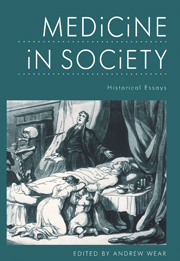Book contents
- Frontmatter
- Contents
- List of contributors
- Introduction
- Healers in the medical market place towards a social history of Graeco-Roman medicine
- Medicine and society in medieval Europe, 500-1500
- The patient in England, c. 1660–c. 1800
- Making sense of health and the environment in early modern England
- Medicine in the age of Enlightenment
- The rise of the modern hospital in Britain
- Medical practitioners 1750–1850 and the period of medical reform in Britain
- Public health, preventive medicine and professionalization: England and America in the nineteenth century
- Madness and its institutions
- From infectious to chronic diseases: changing patterns of sickness in the nineteenth and twentieth centuries
- Providers, ‘consumers’, the state and the delivery of health-care services in twentieth-century Britain
- The implications of increased life expectancy for family and social life
- Index
Introduction
Published online by Cambridge University Press: 13 January 2010
- Frontmatter
- Contents
- List of contributors
- Introduction
- Healers in the medical market place towards a social history of Graeco-Roman medicine
- Medicine and society in medieval Europe, 500-1500
- The patient in England, c. 1660–c. 1800
- Making sense of health and the environment in early modern England
- Medicine in the age of Enlightenment
- The rise of the modern hospital in Britain
- Medical practitioners 1750–1850 and the period of medical reform in Britain
- Public health, preventive medicine and professionalization: England and America in the nineteenth century
- Madness and its institutions
- From infectious to chronic diseases: changing patterns of sickness in the nineteenth and twentieth centuries
- Providers, ‘consumers’, the state and the delivery of health-care services in twentieth-century Britain
- The implications of increased life expectancy for family and social life
- Index
Summary
The social history of medicine has come of age. It is now possible to see in some detail the way in which medicine has developed within society. Whereas before the history of great doctors, great discoveries and great ideas was the staple diet of the history of medicine, now this new but flourishing branch of history gives us a sense of how medicine has affected society and how society has shaped medicine. In the process the definition of ‘medicine’ has been extended and deepened.
The contributors to this book show these changes, but they are only incidentally concerned with historiography, with how to write history. Their main aim has been with writing history itself, with giving to the reader some of the results of the new social history of medicine. Their chapters are synthetic and draw upon recent work in their fields, but they are also based on the primary research that each contributor has carried out.
Overall, this book shows that health care has been of perennial concern to Western society, but the forms it took have been different over time with modern State-influenced health-care systems, hospitals and professionalized practitioners contrasting strongly with the smaller, more open systems that existed before the nineteenth century. Running through the contributions are various themes. The balance of power in the patient-doctor interaction has changed over time. When medical practitioners depended on patients' fees and trade and the patient had a greater choice in practitioners.
- Type
- Chapter
- Information
- Medicine in SocietyHistorical Essays, pp. 1 - 14Publisher: Cambridge University PressPrint publication year: 1992

